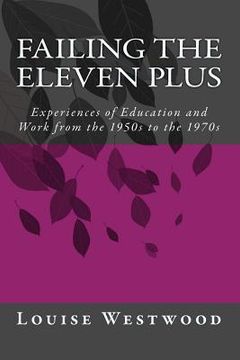Compartir
Failing the eleven plus: Experiences of Education and Work from the 1950s to the 1970s (en Inglés)
Louise Westwood
(Autor)
·
Createspace Independent Publishing Platform
· Tapa Blanda
Failing the eleven plus: Experiences of Education and Work from the 1950s to the 1970s (en Inglés) - Westwood, Louise
S/ 160,85
S/ 321,71
Ahorras: S/ 160,85
Elige la lista en la que quieres agregar tu producto o crea una nueva lista
✓ Producto agregado correctamente a la lista de deseos.
Ir a Mis Listas
Origen: Estados Unidos
(Costos de importación incluídos en el precio)
Se enviará desde nuestra bodega entre el
Jueves 11 de Julio y el
Lunes 22 de Julio.
Lo recibirás en cualquier lugar de Perú entre 2 y 5 días hábiles luego del envío.
Reseña del libro "Failing the eleven plus: Experiences of Education and Work from the 1950s to the 1970s (en Inglés)"
Education history has neglected the Secondary Modern schools and their pupils. This book aims to fill that gap with original contributions from the baby boomer generation (born approximately 1946-64) who went to Secondary Moderns from the 1950s to the early 1970s. There are two research groups, one from contributors who went to Secondary Moderns in the Newcastle, Staffordshire area of the UK and the other from those who joined the Queen Alexander Royal Naval Nursing Service or (for the men) the Medical branch of the Royal Navy; these contributors went to schools all over the country but they also failed the eleven plus. There are a few other contributions from various sources and some from the Mass Observation Archive at Sussex University. The aim of this book is to hear the voices of those who experienced secondary modern education and discover something about their school experiences, work and their subsequent careers. The post Second World war period was a time of considerable change with politicians promising a 'New Jerusalem'. William Beveridge's report in 1942 highlighted ignorance as one of his five giants in need of slaying alongside idleness, Want, squalor and disease. The baby boomers born into this new era are seen as special because they were part of a population explosion after the end of the war. More importantly their welfare was of great concern to the state with free school meals, vaccinations, family allowance, school milk, orange juice, cod liver oil and free health care with the creation of the NHS in 1948. The 1944 Education Act dealt with ignorance and was meant to reorganise secondary education and give all children a fair chance. The policies that came out of the 1944 Act failed because almost 80% of children did not pass the 11+ examination and were sent to secondary modern schools; the vast majority left school at the age of 15 years with no qualifications. The tripartite system (secondary modern, technical and grammar) was a numbers game because places were scarce at the grammar schools. The pass rate was manipulated and the entrance criteria took into account gender, class, residential area, parent's work, and size of family. The IQ test that made up the eleven plus exam did not test intelligence and in wealthier families tuition was used to ensure a good pass. It is clear therefore that poverty, wealth and influence were important factors when attempting to gain a grammar school place. It is easier to compare and contrast the lives of children at the end of the nineteenth century with those in the post Second World war period once there has been a brief overview of the social history around the turn of the 19th & 20th Centuries. For this reason there is a chapter which briefly outlines the history of education from the mid-19th Century and chapter 2 covers a considerable amount of social history which will be useful to contextualise issues raised by the contributors. Nursing and teaching are popular choices for women throughout the 20th Century and many of the baby boomers embarked on these careers; there is a chapter on the history of nursing and the history of teaching training is briefly discussed in the final chapter. There has been a great deal of media attention on education during the new millennium and comparisons are made between the exam systems after the war and those taken now and the opportunities for children then and now.
- 0% (0)
- 0% (0)
- 0% (0)
- 0% (0)
- 0% (0)
Todos los libros de nuestro catálogo son Originales.
El libro está escrito en Inglés.
La encuadernación de esta edición es Tapa Blanda.
✓ Producto agregado correctamente al carro, Ir a Pagar.

